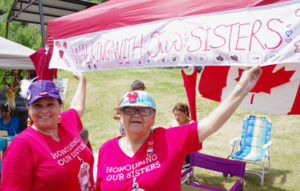Beading from the heart for a good cause

By Rick Garrick
THUNDER BAY—Biinjitiwaabik Zaaging Anishinaabek’s Diane Hardy and Fort William’s Sheila Karasiewicz hosted a red dress pin beading booth at the 2016 Fort William Powwow.
“I’ve made over 350 of these dresses and we will be giving them to the families of the missing and murdered women when the National Inquiry (into Missing and Murdered Indigenous Women and Girls) comes,” Hardy says. “This is our gift from our hearts to the people.”
Hardy began working on her bead-work for the red dress pin project about four months ago. The two women got the idea for the red dress pins from the REDress Project, which was created by Jaime Black, a Métis artist from Winnipeg. Her goal was to collect 600 red dresses by community donation for installation in public spaces across Canada as a visual reminder of the number of Indigenous women and girls who are no longer living.
“We’ve been doing this voluntarily to spread the word (about) what the red dresses represent — all the missing and murdered Native women,” Hardy says. “I lost a sister 50 years ago and they never came up with anything, although just this past year we are hearing a few little things. But nothing really has come out of it.”
Hardy says her sister Doreen Hardy was murdered 50 years ago.
“I’m excited just waiting for the national inquiry,” Hardy says. “We’re inviting people to come and do beadwork. And then we will package all of these [pins] and give them to the families when the national inquiry comes to town.”
Karasiewicz says they are working on the red dress pins to show the families of the Missing and Murdered Indigenous Women and Girls that the community cares about them.
“We want to honour the families with these pins to show that we as a community care,” Karasiewicz says. “We were prompted by this idea when we went to Ottawa and came across the red dress campaign at Parliament Hill.”
Karasiewicz says she and Hardy took their hand drums with them to Ottawa after she had a dream to take them on the trip.
“So we brought them and then we realized why, because we needed to be at Parliament Hill for that red dress campaign,” Karasiewicz says. “So we drummed there. And when the first stage of the national inquiry came to town in January, I had an idea that, hey, we should make these little red dress pins to give to the families.”
The two women initially made “very simple” red dress pins.
“They were just little felt with no beadwork or anything on them,” Karasiewicz says. “And they were so well received and appreciated at that time, so it made us think we should go a little bit more further and make some much nicer permanent pins to give to the families when the inquiry comes back.”
Karasiewicz says about 48 pins were beaded at their National Aboriginal Day booth and about 50 pins were beaded on the first day of the 2016 Fort William Powwow.
“There’s been bead-ins throughout the city through Walking With Our Sisters,” Karasiewicz says. “Hopefully this weekend we will get maybe another 100 more made.”
Karasiewicz says the Public Service Alliance of Canada’s National Aboriginal Peoples’ Circle partnered with Walking With Our Sisters on the project. Karasiewicz is an Aboriginal representative for the Ontario region with the Public Service Alliance of Canada and a member of the National Aboriginal Peoples’ Circle.
“Our target is to make 500 pins,” Karasiewicz says. “And we’re almost there now.”


